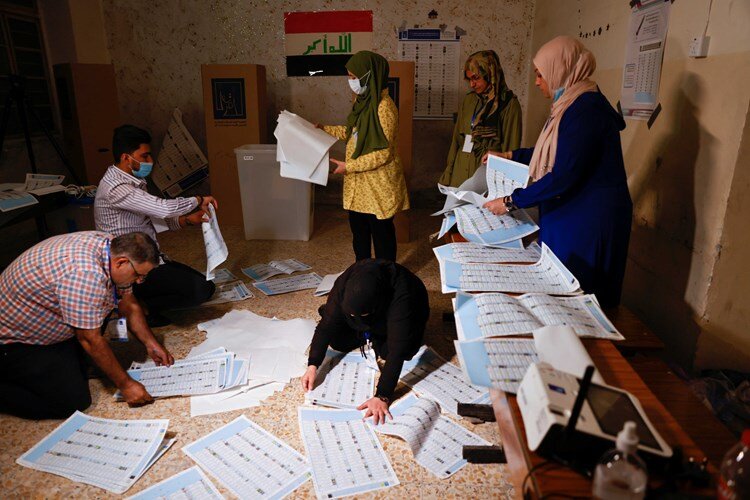Will Sadr cooperate with other Iraqi political factions?

TEHRAN – Iraq’s electoral commission finally announced the results of the war-scarred country’s early parliamentary election which handed a controversial Shi'ite cleric a remarkable lead over other political factions.
The election, held on Sunday, was the main task of the provisional government of Mustafa al-Kadhimi, who succeeded former Prime Minister Adel Abdul Mahdi last year in the wake of nationwide protests over corruption and lack of basic services.
Al-Kadhimi has vowed to stand aside in the election and only act as the implementer of the vote to ensure the integrity of the election. He underlined this on Twitter after completing the preparations for the election.
“We have succeeded in fulfilling our promise and our duty in securing fair elections. I thank our people. I thank all voters, candidates, political powers, observers, IHEC staff, our brave ISF who provided security, the United Nations, and the marjiyya,” the prime minister said.
According to initial results announced by Iraq’s Independent High Electoral Commission, Shia cleric Muqtada al-Sadr’s party won more seats in the parliament than any other faction. Former prime minister Nouri al-Maliki trailed the Sadrist Movement as the next biggest winner among Shi'ite parties.
Kurdish and Sunni political factions close to Sadr also increased the number of seats they hold in the parliament. Other Shi’ite factions such as the Fatah alliance, the political arm of the Popular Mobilization Forces, surprisingly lost most of their seats, prompting a heated debate among observers on the future of Iraq’s position in an increasingly polarized region.
Some pundits and media outlets, especially those affiliated with Saudi Arabia, sought to portray the results of the election as a blow to Iran’s influence in Iraq, ignoring the fact that Iran’s relations with Iraq are beyond the political fortunes of Iraqi political factions.
Saudi newspaper Asharq Al-Awsat reported that “Iran’s allies” in Iraq endured a “harsh defeat” in the elections, winning fewer seats than in the previous vote in 2018. Arab News ran a story saying that “an alliance of Iraqi candidates representing Shi’ite militias supported by neighboring Iran has emerged as the biggest loser in the country’s national elections.”
But these reports ignore a number of facts: first, Iran was among the first countries to congratulate Iraq on the successful holding of its early election. Iranian Foreign Minister Hossein Amir Abdollahian issued a message to his Iraqi counterpart Fuad Hossein congratulating Iraq on the successful holding of the parliamentary vote.
The Iranian foreign minister also announced Tehran’s support for Iraq’s stability and security, saying the Islamic Republic is ready for cooperation with Baghdad on the path toward development and progress in relations between the two nations.
Earlier, Iran’s Foreign Ministry spokesman Saeed Khatibzadeh congratulated the Iraqi government, people and elected lawmakers on successfully holding parliamentary elections.
Second, the biggest winner of the Iraq vote, i.e. Sadr, is no enemy of Iran. Instead, he enjoys relatively good relations with Tehran and has visited the holy city of Qom even when he was politically at odds with Iran. In fact, Sadr does not oppose Iraq having good neighborly relations with Iran. He only seeks to institutionalize these relations for the good of the Iraqi and Iranian people. More importantly, Sadr has not pivoted toward Iran’s regional and trans-regional rivals and enemies despite his occasional political differences with Iran.
Third, Sadr is unlikely to rule Iraq alone. Iraq’s political system requires any majority faction to cooperate with other groups to form a government. Sadr will likely be willing to cooperate with other factions to get his nominated prime minister approved by the parliament. This cooperation is of vital importance to the Sadrist Movement given the fact that the movement won an election with a record low turnout of 41 percent.
Sadr himself proved skilled at political maneuvers. He used to be the kingmaker without exposing himself to public wrath. The nationalist cleric understands that he needs other factions to shield himself from public anger arising from possible inadequacies. This paves the way for another consensual government in Iraq that would cater to the needs of all political groups with Sadr leading from behind and having the final say on all state matters.
